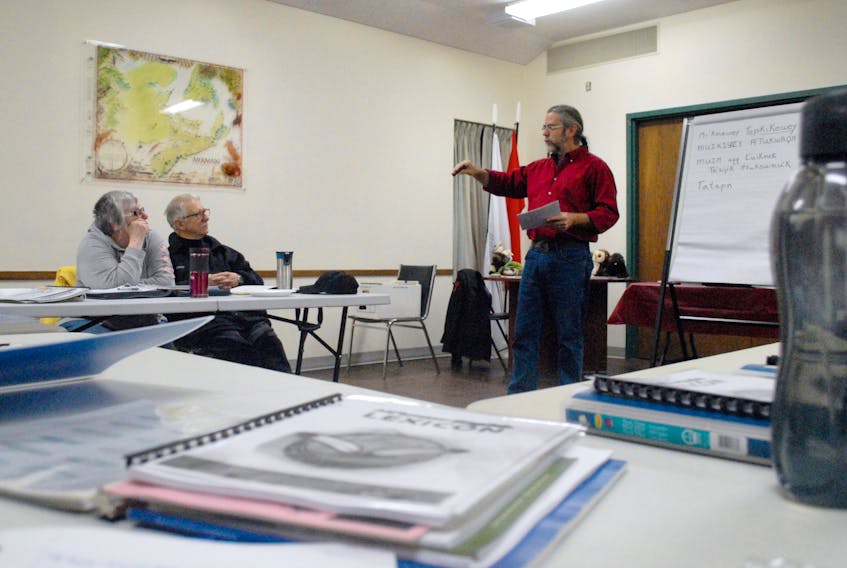LIVERPOOL – Every Tuesday from 5-7 p.m., people gather at the Native Council of Nova Scotia in Liverpool to learn the Mi’kmaq language.
“What we offer is a basic understanding of the Mi’kmaq language,” said Arthur Anthony. “We teach the phonetics, the Smith-Francis Orthography, and then we teach lots and lots of words to show how the orthography works and how the alphabet works.”
Anthony is one of the facilitators of Wju’sn Aknutmuatl (The Wind Speaks to Him or Her) or Wind Talker.
Classes also teach students the names of body parts, how to count, say basic greetings and the names of traditional foods and today’s foods, among other things.
Through literature, students also learn about culture.
“Last week, we did the seven sacred teachings,” explained Anthony.
Those teachings are wisdom, respect, love, humility, courage, honesty and truth, he said.
“At the end of the program, everybody gets the book that goes with it, which is written both in English and in Mi’kmaq,” Anthony added.
The program
The program at the Native Council of Nova Scotia began two years ago.
Terri Faber is with the Queens Learning Network – an adult upgrading school funded by the adult education division of the Department of Labour and Advanced Education.
“Through that, you can also apply on behalf of other organizations for funding through their family literacy fund,” said Faber.
When the Mill Village Consolidated and Milton Schools were open, there was a program for parents to take their kids to and do literacy activities. The idea was to encourage literacy at home, explained Faber.
Then it grew, and there were programs at Dr. John C. Wickwire Academy and North Queens Community School.
“There they became more information sessions for parents. We provided babysitting for the children,” said Faber.
There were sessions on nutrition, video games and brain development, and other things.
“Then, in the past few years, what we’ve done is tried to go back to rooting it in literacy and having the full family involved in our sessions,” said Faber.
Faber says Wind Talker was a new idea that reinvented the program – and partnering with the Native Council of Nova Scotia to do that.
“Diane and Arthur have been amazing, and it’s been quite successful with the participants,” said Faber.
Diane Warner, another facilitator with the program, says there’s no age cap on the free language classes.
“We tell (parents) if you feel that your child can sit for at least an hour to an hour and a half for the teaching pieces, that they can bring them along,” said Warner.
Warner says there are some parents who take their older children to the classes.
The Mi’kmaq language
“We do have a large population of Mi’kmaq people in Queens County,” said Anthony.
Anthony says he’s interested in learning as much of the language as he can, but he adds it’s difficult to learn a language well when there’s no one to converse with. That’s why Anthony thinks it’s important to offer the classes in Queens.
“So by teaching portions of the language to other people, then it helps me learn more, and it also passes it on and keeps it alive more among our members and among the people in the community,” he said.
Years ago, the language was an oral history; nothing was written, explained Anthony.
In the early 1970s, the Mi’kmaq chiefs commissioned Bernie Francis and Douglas Smith “to create an orthography to preserve the language so it could be written.”
Over hundreds of years, words have been written phonetically, and the phonetics used would depend on who wrote the word.
Anthony says the alphabet includes 11 consonants, five vowels, long vowels, diphthongs and Schwa. He says Schwa is kind of like filler.
“A lot of the words have no vowels in them, so they have to be connected somehow, and they use the Schwa to connect those letters,” he explained.
Classes run from September to sometime in March.
Visit https://ncns.ca/ to learn more about the Native Council of Nova Scotia. You can also visit http://www.queenslearning.ca/ for information about the Queens Learning Network.









